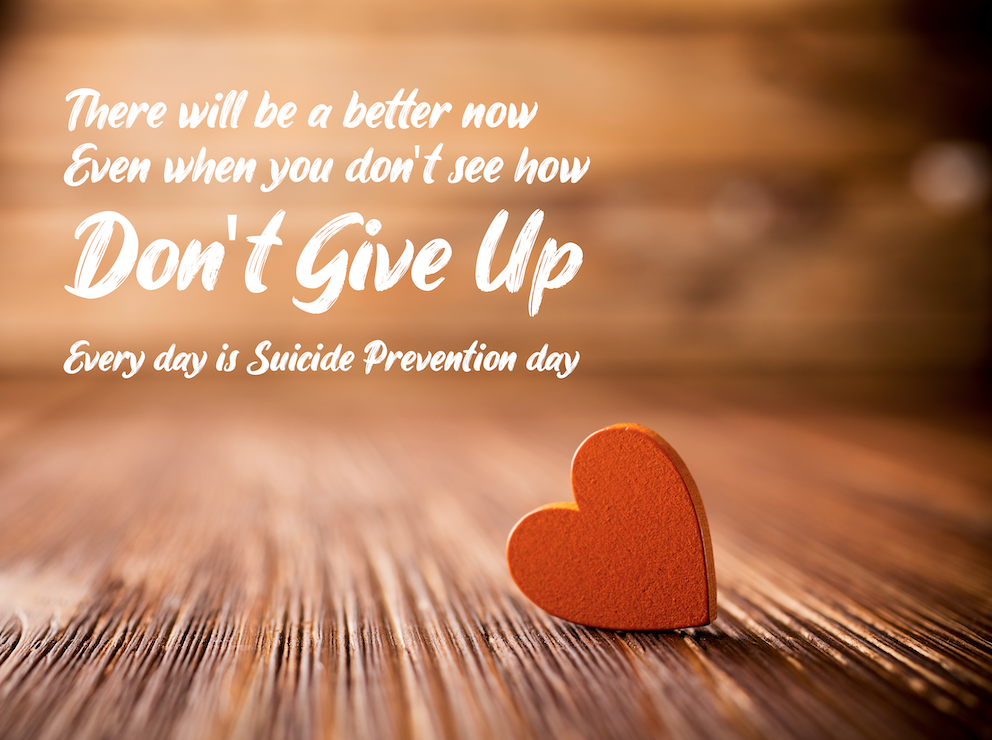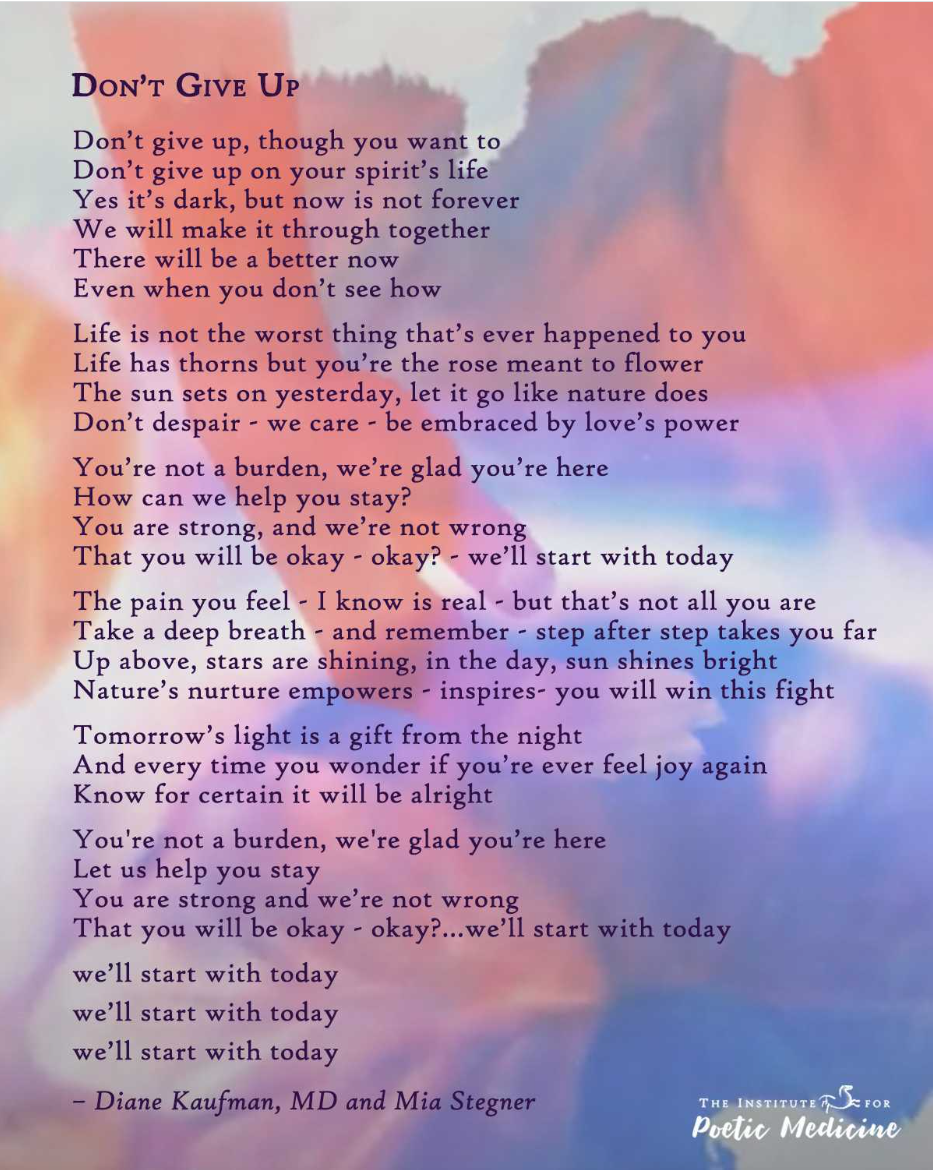|
By Kerry Martin and Lucia Martinez Rojas, Accelerating Social Good We, The Living, Must Shine a Healing Light on Silence, Shame and Stigma: Interview with Child Psychiatrist, Artist and Poet, Diane Kaufman, MDHOPE LIVES. SHAME KILLS. EVERYDAY IS SUICIDE PREVENTION DAY FOR DR. DIANE KAUFMAN, MD. Kerry: As suicide survivors and mental health advocates, Lucia and I both so deeply appreciate your tremendous body of work in suicide prevention. Your award-winning poems, songs, posters, videos and even an opera have inspired hope, encouraged people who are hurting to reach out and offered solace to those who have lost a loved one to suicide. Can you tell us why suicide prevention plays such a prominent role in your life and work? Diane: In August 2019, my friend and mental health colleague Stacy ended her life by suicide. Her tragic death was and still is a shock to me. Stacy was a psychiatric nurse practitioner of great skill and compassion. I respected and admired Stacy for having so many positive qualities. I used to tell myself, if a family member of mine needed care, I would send them to Stacy. Her taking her own life and leaving behind two sets of young twins was absolutely one hundred percent out of character for Stacy – the woman, friend, and mental health professional - that I knew her to be. What ended Stacy’s life – what devoured, destroyed, and killed her – was depression. Even as I say these words, tears come to my eyes. I still can’t believe she is gone. Depression is a physical illness that invades the mind, body, and spirit. And, it can kill. In the early weeks of grieving Stacy, I saw a tree that had shoots coming off of its lower trunk. I took a photo of that tree and wrote the words: “Just like this tree, we all yearn to grow. Hope lives. Shame kills. Everyday is suicide prevention day. Take care of yourself and may you grow ever stronger in your love.” I shared the photo and my words with artist Amanda Meador, and suggested she design a poster. This is how “Just Like This Tree” was born and became the first in a series of “Creative Life Lines” suicide prevention posters. Creative Life Lines reaches out with compassion and creativity to help save lives. Stacy’s death was the pivotal event. There, however, have been other significant events. When I was a medical student, I attempted suicide, and was medically hospitalized. When I was married, my father-in-law killed himself by gun shot. My teenage patient, who seemed to her mother, her teachers, and to myself to be doing so well, hanged herself in 2016. The best friend of my young adult patient died by overdose in 2020. My patient, who had her own history of suicide attempts (prior to when I began treating her), found her friend, and then became at increased risk for suicide herself. All of these tragic events have transformed me into a suicide prevention activist. POETRY TRANSFORMS DEPRESSION AND DESPAIR INTO HEALING AND HOPE Lucia: Why do you choose to express yourself through poetry? And, what was the impetus behind writing the poem, “Don’t Give Up” which you would later turn into lyrics with a song-writer and then two Suicide Prevention Public Service Announcements (PSAs), both a one minute version and a longer five minute version, in hopes that people would share the PSAs far and wide to help those who were struggling? Diane: I turn to poetry to express myself when I am feeling overwhelmed by thoughts and feelings. It’s a way to safely get what is inside of me – what’s troubling me – out into the world and onto a page. It often feels like the poem is a living thing wanting to communicate and be expressed, and I am the one listening and holding the pen to let it out – to be taken in and experienced by another. “Don’t Give Up” was an outpouring of my heart listening to the sadness, depression, despair, and suicidality of my youth patients. It’s a conversation with a suicidal person. The poem is saying even though you want to kill yourself, please don’t do it because I understand how you feel, and I know that your choosing death is not the answer. There are reasons for you to keep living and people who truly care and can help you. HOW DO WE CONVINCE THOSE FEELING HOPELESS TO NOT GIVE UP?
Kerry: There is a quote by Hal Lindsey, “Man can live about 40 days without food, about 3 days without water, about 8 minutes without air, but only for 1 second without hope.” Not surprisingly, hopelessness is the leading predictor of suicide. Speaking as a suicide survivor, I can certainly attest to that being the case for me. For months on end, I battled with feeling like there was no hope that anything was going to get better, no hope I was going to feel anything other than this unbearable sense of loneliness, bleakness and foreboding, no hope for a better tomorrow … really that there was no hope for me. And, then to see those I love seeing me that way and not knowing how to help me was just too much to bear. I was not only hurting but I was hurting them. How do we get people to not give up and give into these feelings of hopelessness? Diane: The first line of the poem/lyric is “Don’t give up even though you want to.” Many people – maybe all people – have at times felt like giving up - wishing they were never born, wishing they could just sleep forever, wishing they could be dead, and for some – wanting to end their emotional pain by killing themselves. I want the person listening to the song to feel the song is being sung just for them. For them to know they are not alone in feeling hopeless, and yet also to know that this day is not forever, there will be another day and life can change for the better. As long as there is life and there is help available there is hope. Suicide is forever. The severe emotional pain coming from depression and/or severe life stressors can be helped, lessened, and improved while we are still alive. We don’t have to kill ourselves to stop the pain. I know this to be true as I have lived it. When we are depressed, our thinking gets distorted and it’s as if all we see is darkness. It’s important to be compassionately reminded that, “There will be a better now even when we don’t see how” and that “Tomorrow’s light is a gift from the night.” WHAT MORE CAN WE ALL BE DOING TO HELP OUR CHILDREN STRUGGLING WITH THEIR MENTAL HEALTH? Kerry: Given your specialty is child psychiatry and you see in your practice teens who struggle with suicidal ideation or who have attempted to take their own lives, what more do you think we need to be doing to help our kids given suicide rates are increasing in this demographic? Diane: In October 2021, the American Academy of Pediatrics, American Academy of Child and Adolescent Psychiatry and the Children’s Hospital Association declared a national emergency in youth mental health. This declaration should inspire and galvanize us to collaborate on behalf of youth mental health by improving access, services, and resources. We need more mental health providers and services available. We need more in-patient psychiatric beds available, as well as a higher level of care and specialty programs. Social media can damage youth mental health when self-worth is judged by “likes” and when sense of self and self-esteem plummets by negatively comparing ourselves to online profiles of others. Youth need healthy social connections and to experience themselves as worthwhile. They need caring adults who will ask the questions – “Are you okay? Are you feeling anxious and/or depressed? Are you thinking about hurting, cutting, and/or killing yourself? You can tell me because I care about you.” Youth need to know there is no shame in seeking help and that mental health is physical health and help is available. Mental health education should be integrated into all school settings. There are skills and coping strategies we all need to learn and practice. We also need to understand the warning signs of mental illness so we can better recognize when things are not okay with us. HONORING AND PRACTICING THE HUMAN ART OF CONNECTION TO PROMOTE MENTAL HEALTH AND NUTURE RESILIENCE Lucia: Diane, you have also worked for many years as a Child Psychiatrist back East and now in Oregon, and have extensive training in the therapeutic use of poetry, art, and story. Now, as Founder and Director of the Arts and Healing Resiliency Center at Mind Matters, PC, how are you working to eliminate silence, shame, and stigma to prevent suicide? Diane: Mental health well-being can be nurtured in many different ways. I have Bipolar II Disorder, attempted suicide as a young adult, and became a child psychiatrist. Sharing my story helps break through silence, shame, and stigma. I am an ASHA International storyteller and am on their Board of Directors. It’s a great organization that highlights the “superpower” of our personal mental health stories. The expressive arts can also play a vital role in facilitating and fostering mental health. The inspired mission of the Arts and Healing Resiliency Center is to honor and practice the caring art of human connection. The ARTS Program, our unifying concept, inspires Adolescent and Adult Resiliency Training as well as Skills and Support by interweaving evidence-based mental health skills, positive psychology principles, and the creative arts to promote, nurture, and build mental health and life affirming resilience. The goal of the program is a felt sense of personal integrity, authenticity, and responsibility leading to social-emotional and behavioral well-being. We offer online workshops, special events, mentoring, and therapy. Creative Life Lines, the community outreach facet of the Arts and Healing Resiliency Center, is dedicated to suicide prevention and offers posters, songs, and stories as healing resources. Through my own creativity and collaboration with other artists, I hope to continue to address mental health themes such that a healing light shines on all and silence, shame and stigma is banished. To learn more about the Arts and Healing Resiliency Center and Dr. Diane Kaufman, please visit Mind Matters, PC. AUTHORS: Kerry Martin, CEO and Founder, Accelerating Social Good, and Lucia Martinez Rojas, Social Media Strategist and Videographer, Accelerating Social Good with guest Diane Kaufman, MD, Child Psychiatrist, Humanism in Medicine Awardee, and Founder and Director, Arts and Healing Resiliency Center, Mind Matters PC. Like the blog authors, Dr Diane Kaufman, MD, Kerry Martin, CEO and Founder, and Lucia Martinez Rojas, Social Media Strategist and Videographer, both from Accelerating Social Good and both also suicide prevention activists, we at National Shattering Silence Coalition believe everyday is suicide prevention day. We are currently running a 'Still Here' suicide prevention campaign to raise awareness about our public epidemic of suicide. At the highest risk of suicide are those with a serious brain disorder, commonly referred to as a serious mental illness. To listen to stories from those who have lost someone to suicide and to learn more about how you can help, please visit 'Still Here'. #suicideawareness #suicideprevention #stopsuicide #endsuicide #nssc #treatmentbeforetragedy #seriousmentalillness #seriousbraindisorders #bipolar #schizophrenia #mentalhealth #mentalhealthcare #mentalhealthawareness #mentalhealthcarereform #parity #abedinsteadD #justice4sbd #righttotreatment #hipaahandcuffs #lifelongcare4sbd #parity4sbd #fundingequity #nationalshatteringsilencecoalition #shatteringsilence #stillhere #hope
0 Comments
Leave a Reply. |
Categories
All
|


 RSS Feed
RSS Feed
